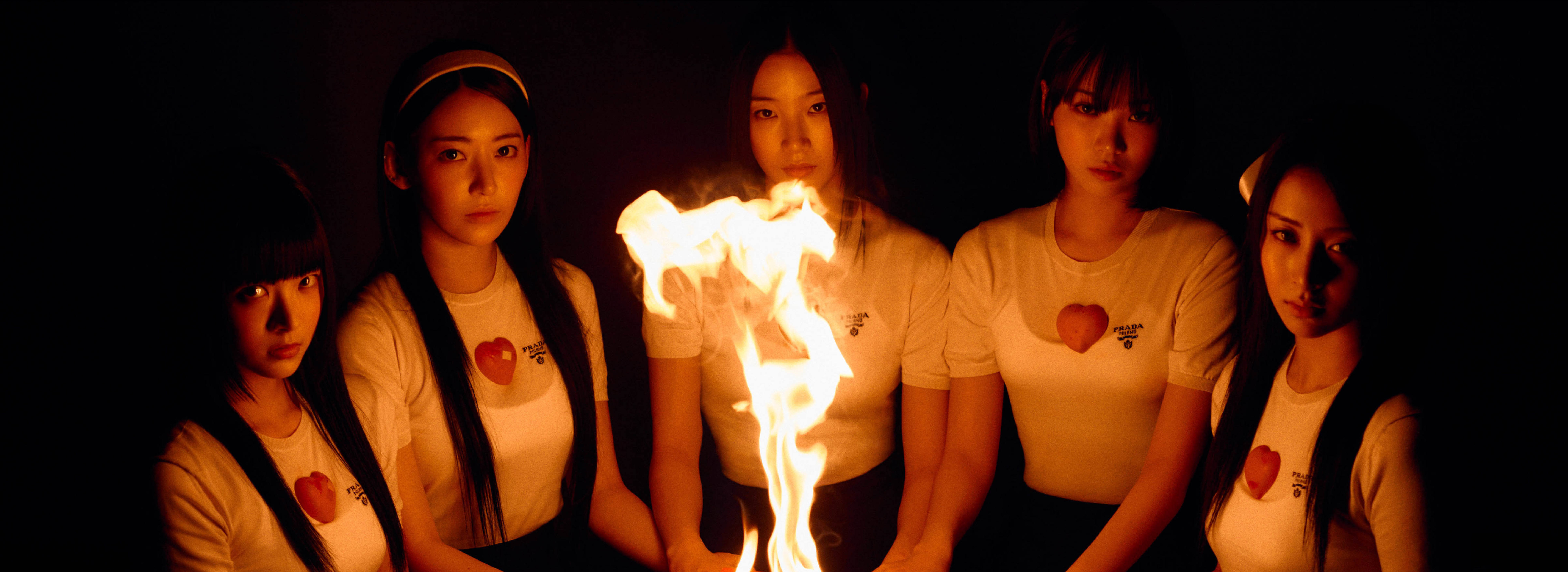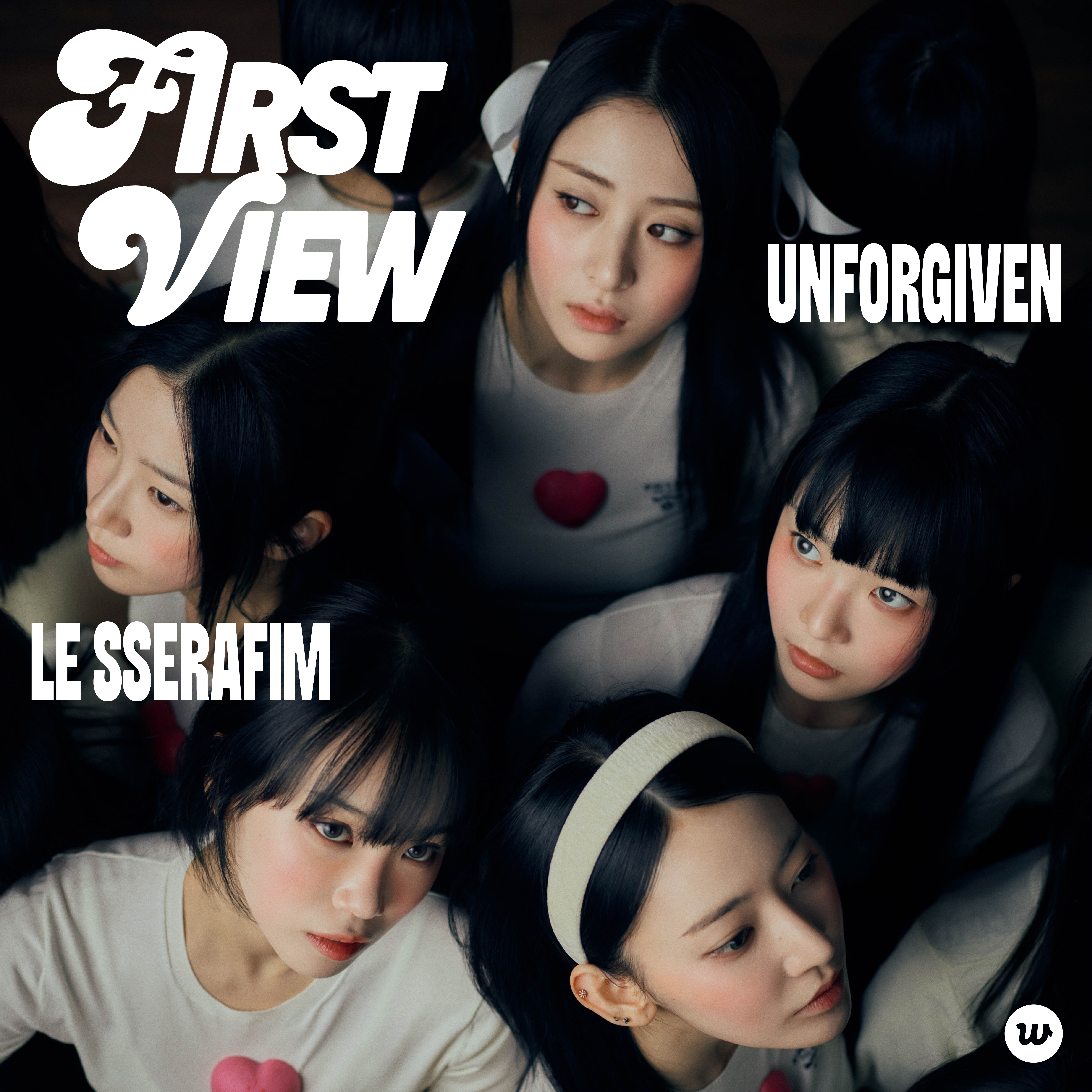
Fulfilling a desire for solidarity
Kim Rieun: LE SSERAFIM defines themselves as “a villain” and “the problem” in “FORGIVEN” (feat. Nile Rodgers), the title track off their first studio album. They “got no invitation” in “No-Return (Into the unknown)” and dream of forbidden desires in “Eve, Psyche & The Bluebeard’s wife” (“Don’t look wanna look / These taboos all around me / Like Eve that day”). The group’s self-representation also comes across on “Burn the Bridge,” which is based on things the LE SSERAFIM members said and wrote. HUH YUNJIN takes aim at the injustices in the world that demand she “can go forward but only within the limit” and challenges those taboos, declaring her determination to “open them all / The path I meant to follow is back there.” The power that allows them to open the door that leads to that path is solidarity. “Burn the Bridge” opens with KIM CHAEWON repeating her line about “faith in myself” from past interviews and leads to a group proclamation: “We don’t have to be forgiven.” It's for this reason that LE SSERAFIM asks “unforgiven girls” and “unforgiven boys” to “come … with me” in the title track, “UNFORGIVEN.” The group’s debut song, “FEARLESS,” was something like an aside: a way of defining themselves (“I’m fearless”) so that their audience could hear at the same time. With their latest release, they’re still sending out a loud message, but now it takes the form of a conversation.
Both “FEARLESS” and “ANTIFRAGILE” were about LE SSERAFIM’s desire to go higher and higher (from “I want to reach the top” to “I’ll climb higher”). The idea was connected with, and became even more realistic through, the members’ personal lives, like SAKURA and KIM CHAEWON’s previous debuts and HUH YUNJIN’s time on an audition reality show. With “UNFORGIVEN,” their desire has expanded to command the zeitgeist of an entire era (“It’ll be remembered as a new era, unforgiven”). The hip hop/funk “UNFORGIVEN” shows off each member’s unique traits and swag with the repeated rap in the hook (“Unforgiven I’m a villain I’m a / Unforgiven I’mma walk that road”); HUH YUNJIN’s lyrics in the second verse (“That’s my style I’m livin’ livin’ livin’”) are accompanied by choreography reminiscent of rock stars’ spontaneous stage presence; and the gaps are filled with a catchy, sing-along-worthy K-pop melody inviting listeners to “come to that faraway land with me, my ‘unforgiven girls.’” The track’s exciting atmosphere comes from its mix of genres and styles that best allows the members to express who they are and where they’ve been, plus a dash of just the right kind of sound for listeners to latch onto. LE SSERAFIM are really singing about “a new era” or wave of K-pop artists who take pleasure in twisting heavy themes centered around taboos and forgiveness.
BTS made use of their own journeys and took the frustration toward being a part of the yukpo generation that has given up on traditional rites of passage and turned it into hope under the “love yourself” concept. TOMORROW X TOGETHER has become a Gen Z icon by tackling the hyper-specific despair and defeat felt by a generation living in a world where so much has already been accomplished before them. In a time when K-pop is increasingly becoming a key source of entertainment that reflects the era it’s born in and the youth of the time, LE SSERAFIM is speaking to everyone with flaws and desires, regardless of their generation or gender. The song “Eve, Psyche & The Bluebeard’s wife” uses repetition of the phrase “I’m a mess” as a core musical phrase. The song recalls women’s forbidden desires as metaphor in stories, like Eve eating the fruit of good and evil, Psyche nearly losing her husband after challenging taboos and the Bluebeard’s wife who almost died because she didn’t follow her husband’s orders. The reason LE SSERAFIM surfaces the metaphors here is to reflect their self-representation as a group of women. Having said that, they also extend a hand to both “unforgiven girls” and “unforgiven boys” in “UNFORGIVEN,” and emphasize the bond between listeners through the excitement of adventure in “No-Return” (“You’ve become my guiding star”). In Burn the Bridge, the trailer for UNFORGIVEN, SAKURA is wounded and looks at herself in the mirror, but the image in the mirror changes to reveal all the members of the group facing one another. When they announce, “We’ll burn it all and it will light our way,” a blue wave appears in front of them. New doors open only when taboos are broken and a majority of people help to do so. “Let’s go beyond together,” LE SSERAFIM sings out, starting a revolution—a new chapter in K-pop history that captures the cultural zeitgeist.
Dancing together
Kang Myungseok: The choreography for the title track off LE SSERAFIM’s new album UNFORGIVEN is a reflection of the message behind the song. When the group members sing, “Unforgiven I’m a villain,” during the hook, they make devil horns on their heads with their fingers. CHAEWON kneels down as she sings, “I was powerless, used to lose every fight,” and the other four members stand beside her like pillars. CHAEWON then stands up, singing, “but I ride,” and the others move behind her like a shadow, walking in place. As a way for the dance moves to convey the song’s message, the members take turns in the foreground while the other four support them in the background, adding an almost cinematic quality to the lyrics. The performance clearly requires an amazing amount of practice and teamwork and brings even more to the song than the lyrics alone can. Next, the members move from their diagonal formation behind CHAEWON and stand left to right across the stage, at which point HUH YUNJIN bends back a full 90 degrees and looks right into the camera—a move made possible solely thanks to the two girls on either side who hold her hands to support her. We can even say their handholding helps break the taboos alluded to in “UNFORGIVEN,” given the lyrics for this part are, “Never asked for forgiveness or anything / Gonna target taboos, watch me now.” Little touches in the lyrics, like how they go from “villain” at the beginning of the song to “unforgiven girls,” highlight how important it is to remember that “our names surpass all limits” when conquering taboos, and the way the members support each other when they dance proves why they must work together.
KAZUHA opens up “UNFORGIVEN” (feat. Nile Rodgers), moving out from the other members and to the front of the stage. The song shares its title with a film directed by and starring Clint Eastwood, and it also samples the main theme from The Good, The Bad and the Ugly, so KAZUHA’s movements can be interpreted as a scene in a Western: the protagonist pushes her way through the swinging doors of the all-too-familiar saloon. The movie Unforgiven follows what happens after a group of women put a bounty up for anyone who will do away with the people who wronged them. In LE SSERAFIM’s Western, it’s the women who take on the lead roles. Just like Unforgiven is considered a landmark work in the history of Westerns, “UNFORGIVEN” explains where LE SSERAFIM finds themselves today using the grammar of Western film. “Remembered as a new era, unforgiven” is born out of a distaste for “shabby hand-me-downs,” and the twist comes when those who are unforgiven—sometimes seen as villains, evil women or witches (“if belief’s a sin, I’m a villain”)—turn out to have been ahead of the curve all along. LE SSERAFIM’s gender-reversed take on the typical Western setup reveals the times are changing and the unforgiven no longer feel a need to be forgiven at all. But later, in the third time through the chorus, the group members come together for a big jump, arms stretching out. Going from “the unforgiven … villain” to coming together as one and bringing about generational change is a form of freedom, where they can bounce to the beat and let loose. The message the “unforgiven girls,” whose “names surpass all limits,” send to the “unforgiven boys” (“Come and cross the line with me, my ‘unforgiven boys’”) adds to the energy of the choreography and shows the gesture of the message is done freely, not under any kind of pressure to do so. This is what unforgivable villains can do when they become “girls” who don’t need to be forgiven. It’s LE SSERAFIM showing what they believe a girl group is meant to do on stage today.
Raise the anchor of adventure
Kim Yunha (music critic): Words have power. It’s undebatable. Everyone knows you can push yourself to action just by saying, “I’ve got to do this!” or find renewed energy by announcing your intention to your friends. LE SSERAFIM’s first studio album, UNFORGIVEN, opens with a victory lap of the words they shouted out to the world when they made their first appearance. Under the “FEARLESS” banner is the unstoppable ambition to grow stronger and overcome a world with a judgmental eye. Covered in “ANTIFRAGILE” stickers, they coolly dare people to take their best shot and toss them into the Black Sea, because it only makes them stronger. All of that’s still here.
The first question to come to mind is, “Considering how powerful words are, was this really the right move?” Especially since this format isn’t very common for an album. The first half of UNFORGIVEN’s 13 songs is a point-by-point summary of what LE SSERAFIM offered up through their two EPs last year. It includes the two intro tracks (“The World Is My Oyster” and “The Hydra”), the catchphrase-like title tracks (“FEARLESS” and “ANTIFRAFILE”) and is rounded out with “Blame Flame” and “Impurities.” The two EPs, already like a pair of twins, come across on this latest album as fully decalcomania-esque mirror images of each other. It's not unusual for studio albums to include previous hits in the middle, but the tracklist on UNFORGIVEN is unconventional in this way.
It only becomes clear why they took the approach they did after passing the album’s midway point: In this album, too, LE SSERAFIM once again addresses the listener. Unlike the intro songs off their EPs, the intro here emphasizes voice over beat: “I have faith in myself. Confidence. A firm belief that I’ll never regret the decisions I make.” KIM CHAEWON’s tone of voice and the words she speaks are a perfect match: firm and smooth like a pebble. “Burn the Bridge,” which was released ahead of the album with the teaser video, inspires even greater confidence thanks to tangible proof of the six earlier tracks showing how much they’ve gone through to prove themselves over the course of the past year.
The album gives itself a strong base of the familiar side of LE SSERAFIM to build on, then gets to work trying new ideas that require the space of a full studio album. The title track on UNFORGIVEN got people talking thanks to the presence of legendary producer and guitarist Nile Rodgers and combines edgy beats, whistling right out of a Western and the kind of catchy chorus you’ve come to expect from LE SSERAFIM. The song’s followed by the refreshing disco pop “No-Return,” with its amazing brass section, and “Eve, Psyche & The Bluebeard’s wife,” a Jersey club song that places the group among the ranks of next-generation performers. Borrowing the group’s fandom name, “FEARNOT (Between you, me and the lamppost)” credits every member for contributing to the lyrics, including HUH YUNJIN, who’s also given a composition credit, and the song’s touching message gives the whole album the kind of sentiment expected from a K-pop album. “Flash Forward” is a guaranteed pop hit, and while the group has previously reserved the final track on their albums for such songs, here it appears second last.
Anyone who’s been watching LE SSERAFIM up until now and expecting a certain format for the last song will be surprised to hear the album closer, “Fire in the belly.” Petals rain down like unexpected fireworks and your view is further obscured by the layers of a rainbow-colored skirt. Just then, a hand cuts through the confusing chaos and appears directly in front of you. And you hear a voice: “Join my crew.” Again.
I see it this way: Across three albums now, LE SSERAFIM has been at odds with someone and has had to fight back against them—someone trying to scare them, break them and finally force them to believe they need to be forgiven. They are the things that make us feel lonely and distressed, like we’re shadowboxing in the dark. Sometimes we can’t find a single hint about what they are, let alone a clear answer. UNFORGIVEN represents LE SSERAFIM throwing their hat into ring against a hidden foe who’s so sneaky that no one can take revenge on them because they’re impossible to put into words despite feeling so familiar. Out of that narrative is born the message that penetrates the whole album: “Alone we meander, but together we adventure.” Listening to this new album on repeat—what feels like a compendium of the group’s past year together—it feels like an adventure has just begun. The energy LE SSERAFIM has called forth through the power of their words is as potent as ever. If you take that hand—if you join the crew—you just might be able to figure out who that hand belongs to as you set out. Weigh anchor! LE SSERAFIM captains the ship of adventure forward—without fear and without forgiveness.


Unauthorized reproduction and distribution prohibited.
